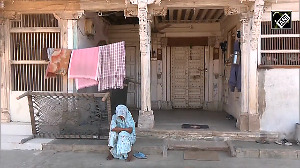Talking to client-turned-ad man MG (Ambi) Parameswaran, executive director, FCB-Ulka Advertising, is a journalist's delight. He takes precisely half a second to answer any question and less than a minute to come up with spotless analysis.
Having led FCBUlka for more than a decade, this former IIT-ian knows advertising like the back of his hand.
Set to play a prominent role in the Pan-IIT Global Conference 2006 to be held in Mumbai in December 2006, Parameswaran spoke to Senior Associate Editor (Features) Indrani Roy Mitra about IIT-ians' contribution to the Indian economy, the issues that the forthcoming meeting will deal with and the broad IIT vision.
Excerpts:
IIT-ians are the pride of India. What do you think is their biggest contribution to India?
Some IIT-ians have set up enterprises in India, some IIT-ians have gone to teach. More importantly, some have become technology goodwill ambassadors of India. Their contribution is to plant the Indian technological flag on the global map.
What sets IIT graduates apart from others?
I don't think it is fair to say that IIT-ians are a unique breed and that they are completely different from other graduates. India produces great engineers and IIT-ians only come from premier institutes of the country.
What sets IITs apart from other engineering institutes is a constant focus on problem-solving. As students, we never did any theory question. Everything was related to problems and how to crack them. IITs teach their students to take each problem at a time and seek a solution.
When you made it to the IIT what was that experience like?
After completing my XI, I was planning to apply to Loyola College in Chennai. That time I had done some homework and was toying with the idea of joining chartered accountancy course. I was almost filling in PUC forms. That is when my father intervened and said that I should study engineering from some IIT. Till then I had no idea about IIT, entrance examination.
I took the necessary preparation and got through. When I went to check my marks at the Loyola College mark sheet, a classmate of mine, who is now a very well known architect, asked me which engineering I was going to, I said I was joining IIT. He could not believe his ears -- he just could not digest that one of the backbenchers was actually making it to IIT.
Preparing for IITs that time was pretty easy compared to the preparation one needs to go through these days. We had to tutor ourselves for four hours a day for about a month. Now it takes about two years to sit for the IIT entrance.
Did you have any role model who inspired you in your career?
Not exactly. I was definitely aware of my friends doing well in their respective careers -- some going abroad to do their MS, some doing MBAs and so on and so forth. But there was no particular person whom I idolised.
How did IIT education prepare you?
I was not a top ranking student in IIT. In fact, I was pretty scared of calculus. Around third year, I decided I would move from technology to a more managerial kind of work. After IIT, I did management from IIM Calcutta. I spent two years there. Ami kom kom bangla jaani (I know a few Bengali words).
IIT basically taught me not to be scared of problems. Rather, it taught me to break them into parts and take each part a time and solve it. This kind of learning stays with you all your life. For, life is full of challenges and you just cannot ignore them
'Inspire, Involve and Transform India.' Can you dwell upon the significance of the theme for this year's Pan-IIT global conference?
This is a nice acronym for IIT. The organisers felt that the global conference should not restrict itself to an opportunity to network. There should be a larger agenda -- to create a fixed track on how IIT-ians today are involved in inspiring, involving and transforming India. Be it in the area of education, environment, low-cost energy sources -- the conference's aim will be to highlight on the IIT-ians' contribution.
Many IIT-ians have preferred to go abroad rather than work in India. Do you think this trend is changing now? How can India retain its talented people?
At a conference, our director M S Anand put it nicely. He said: There is a myth that the IIT-ians leave the country. If you look at the history of the last 50 years, you will see that only one-third of the IIT-ians left the country, one-third went to management institutes and the rest will work in the industrial sector. Same is true with other engineering institutes. So it is unfair to blame the IIT-ians alone for going abroad.
The main issue of the past has been that of brain drain but that in turn has now become brain gain. For, those people who went abroad to plant the flag of Indian technological prowess. They are the people who have inspired people to invest in India and in many cases, they have come back to invest here.
So in the long term, the IIT-ians have helped India benefit.
What are the challenges that India faces in the new millennium? How can IIT-ians help address these challenge?
India faces a lot of challenges and I don't we can single out the challenges. I feel IIT-ians can play significant roles in areas like infrastructure, education, resource development, human resource development. They can also have very important roles in the field of technology and telecommunication.
How would you rate India in terms of advertising excellence?
Indian advertising industry is probably as good as the best in the world. We have some very good strategic thinkers in the advertising world. We have excellent creative minds. Indian media professionals and planners are in demand across the world. We would rank among one of the better advertising countries of the world.
But if you look at the yardstick of how many awards India has won, India would have no place. But so would Japan and China. But if you look at the thinking minds and the senior people working in the advertising world, India is definitely a force to reckon with.
A host of top ranking management students as well as IIT-ians throngs the advertising world thereby strengthening it.
What keeps India from becoming a product giant like it is in services?
Do you mean to say India is services giant? I don't think so. Even in this field, India has a long way to go till we become the service provider to the world.
In manufacturing, the problem has been that of erstwhile protective economy. As a result, Indian manufacturers produced a quality good enough for the Indian markets. Now that the market is opening up, the quality standards have gone up. I won't be surprised to see a lot of Indian products -- be it Indica cars, Tata trucks or Tata Tea -- traveling around the world. It has started happening and will gain momentum.
What advice would you give today's IIT-ians who are tomorrow's entrepreneurs?
Today, the IIT-ians have the whole world ahead of them. In our times, India was looked down upon as a country of elephant riders, snake charmers and black magic.
Today, India is seen as a very competent country, technologically speaking. The IIT-ians need to go to areas where they will do higher value addition. They should look at propriety research, IPR. They need to think big. They should start seeing the world as their oyster -- there is a world of opportunity in front of them. They must have a broad idea of what they want to do with their lives.
Lastly, nothing succeeds like hard work.
What role can IIT-ians play to develop India as a knowledge economy?
IIT-ians are already teaching as professors in renowned universities. IIT-ians can try and help in capturing the knowledge that we have in more transmittable forms. They have to see -- can they write cases, can they write case studies, can they build models which can then be shared with the future generation.
Country's progress will depend on how far IIT-ians can transmit knowledge from one generation to the other.
What would be your advice to people aspiring to join the field of advertising?
Advertising is an exciting industry. If India's economic growth has to be 7-9%, advertising will continue to grow. It's a myth that only copywriters and art directors are needed in advertising.
Advertising needs people who can think strategy, people who can work with numbers, it needs a lot of high-class talent. The advertising pays reasonably well. It is, perhaps the only industry wherein you can sit an watch a film during office hours. For, it is an idea that you are looking for all the time in advertising.
In what ways have the earlier Pan IIT events helped? What projects has it worked on?
This exercise of getting the IIT-ians together is a huge attempt. The first conference was in San Jose, second in New Delhi, third in Washington, DC and this time it will be in Mumbai.
Through such conferences, we are exposed to a host of IIT-ians working in different sectors -- we are able see projects they are involved in.
Apart from getting the IIT-ians across the world, such conferences also help them to think what exactly they can do to help the country.
What does money mean to you?
Money is means to an end. Money can't buy you everything but it can definitely help you get rid of some of your headaches.
Should India have more IITs?
I was told by one of my professors that many students who are capable of studying in the IITs, do not get a chance for sheer lack of seats.
Hence, having more IITs is definitely a welcome idea. But at the same time, while making more such institutes, one has to keep in mind that quality can never be compromised.
If we are building more IITs, we must have proper residential campus for the students, we must provide excellent laboratory and workshop facilities, we must have an in-campus library and lastly a flawless system of education and a sound student-teacher ratio. Every IIT should have a sole aim -- that of achieving excellence.
Pan-IIT Conference: Complete Coverage
Participate in the PanIIT 2006 Global Conference! Click here to register now






 © 2025
© 2025